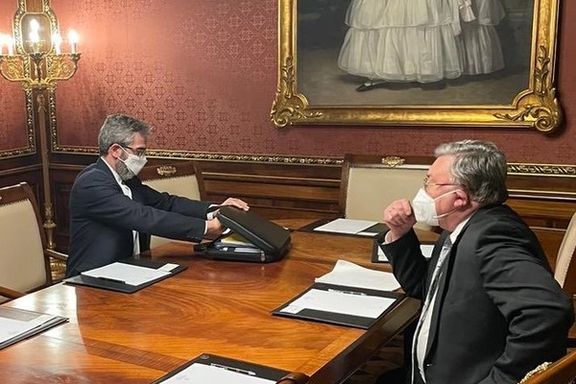Iranians Continue Criticizing Russia For ‘Obstructing’ Nuclear Talks

Some media and politicians in Iran continue criticizing Russia for “obstructing” the nuclear talks in Vienna that could have lifted most sanctions against Iran.

Some media and politicians in Iran continue criticizing Russia for “obstructing” the nuclear talks in Vienna that could have lifted most sanctions against Iran.
Hardline newspapers continue to defend Russia's aggression against Ukraine and tend to minimize the impact of Moscow's demand for exemption from Ukraine sanctions on Iran's nuclear deal with the West.
Russia on March 5 tied the fate of a nuclear agreement with Iran to sanctions the West has imposed for its invasion of Ukraine, demanding exemptions in its economic and other relations with Iran. The 11-month negotiations in Vienna “paused” in what was seen as a deadlock after the Russian demands.
Taking Iran 'hostage'
Ali Motahari, a prominent former lawmaker wrote in a 12 March tweet that "in the last stage of efforts to revive the 2015 nuclear deal Iran should get rid of its fear of Russia and solve the remaining problems through holding direct talks with the United States."
Motahari reminded that "Russia is seriously concerned about the revival of the JCPOA and an improvement in Iran’s relations with the West. Russia wants Iran to be Moscow's hostage and act as a shield to support Moscow in the conflict with the West."
Meanwhile, according to Etemad Online website in Tehran, Hassan Khomeini, the grandson of the founder of the Islamic Republic Rouhollah Khomeini said that "Relying on foreign nations is a mistake as other countries, whether friends or foes, serve only their own interests."
He suggested that the Iranian government should not "fall in love with the East or West," and that Iran should rely on its own national identity. Also, the young Khomeini in reference to Russian invasion stressed that the nation "hates aggression and no one should defend it." He also reminded that his grandfather had defended the people of Afghanistan against Russia's invasion in the 1980s. Iranian officials have blamed the United States and NATO for Russia’s action.
In another article on Saturday, the website quoted political analyst Fayyaz Zahed as saying that Tehran's dependency on Russia will create endless problems for Iran. Zahed said if Iran fails to control Russia's excessive demands, Tehran will fall into the trap of perpetual tensions, and this can shift the pressure exerted by the West on Russia to others in the Middle East. Zahed shied away from naming Iran and vaguely referred to the Middle East.
He said Russia obstructed the final stage of the talks in Vienna while everyone expected an agreement in late March. Russia's behavior, said Zahed, was tantamount to taking Iran and its interests hostage.
Divide among hardliners
In the meantime, a divide is taking shape among conservative newspapers in Iran. Last week all followed the party line of supporting Russia and blaming the United States for the Ukraine crisis. They are still doing so, but a change is taking shape about their reaction to Russia's obstruction of the nuclear deal.
On Saturday, Khorasan newspaper criticized Foreign Ministry Spokesman Saeed KHatibzadeh for blaming "Foreign elements" for obstructing the talks and asked: "Why you do not want to name that foreign element?"
This comes while hardliner daily Kayhan and IRGC mouthpiece Akhbar-e Sepah newspapers continue to support of Russia’s policies in all respects. The Kayhan claimed that Russia's attack on Ukraine has had "marvellous benefits" and revealed double standards in world politics.
Akhbar-e Sepah, which according to Didban Iran website, is the IRGC's internal publication, stressed that the United States and not Russia should be blamed for the failure of the talks in Vienna. The publication claimed that the parties to the JCPOA deliberately kept silent about the fact that the United States has refused to accept four of Iran's conditions. It further claimed that the talks were still a long way from reaching any results.